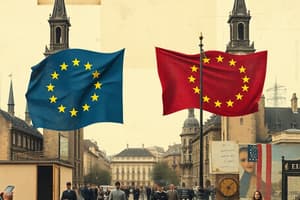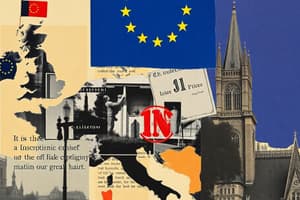Podcast
Questions and Answers
What treaty marked the creation of the European Union?
What treaty marked the creation of the European Union?
- Lisbon Treaty
- Treaty of Rome
- Treaty of Maastricht (correct)
- Paris Treaty
Which countries joined the EU during the 2004 Eastern enlargement?
Which countries joined the EU during the 2004 Eastern enlargement?
- UK, Ireland, and Denmark
- Estonia, Latvia, and Lithuania (correct)
- Austria, Sweden, and Finland
- Greece, Spain, and Portugal
Which of the following is NOT a founding state of the European Coal and Steel Community (ECSC)?
Which of the following is NOT a founding state of the European Coal and Steel Community (ECSC)?
- Germany
- Luxembourg
- Italy
- Spain (correct)
What year was the Lisbon Treaty enacted, affirming the legal foundation of the EU?
What year was the Lisbon Treaty enacted, affirming the legal foundation of the EU?
Which of the following principles is NOT included in Article 2 TEU as a value of the EU?
Which of the following principles is NOT included in Article 2 TEU as a value of the EU?
Which country held the EU presidency when Austria applied to join the union?
Which country held the EU presidency when Austria applied to join the union?
What was the result of the 1975 referendum in the UK?
What was the result of the 1975 referendum in the UK?
Which of the following countries did NOT join the EU in 1995?
Which of the following countries did NOT join the EU in 1995?
What was the main reason Italy provided for missing the transposition deadline for Directive 70/458/EEC?
What was the main reason Italy provided for missing the transposition deadline for Directive 70/458/EEC?
How did Italy justify its failure to transpose the directive on time?
How did Italy justify its failure to transpose the directive on time?
What did the EU's sixth VAT Directive 77/388 change regarding VAT?
What did the EU's sixth VAT Directive 77/388 change regarding VAT?
What was the consequence for Germany not implementing the VAT directive by its deadline?
What was the consequence for Germany not implementing the VAT directive by its deadline?
What argument did Italy present regarding the transposition deadline being too short?
What argument did Italy present regarding the transposition deadline being too short?
What action did the Commission take against Italy in June 1975?
What action did the Commission take against Italy in June 1975?
What was one of the main implications of Germany's late implementation of the VAT law?
What was one of the main implications of Germany's late implementation of the VAT law?
Which of the following statements is true regarding the implementation timeline of the VAT directive?
Which of the following statements is true regarding the implementation timeline of the VAT directive?
What is the primary intention of Article 45 TFEU regarding workers within the Union?
What is the primary intention of Article 45 TFEU regarding workers within the Union?
According to the ECJ's Gebhard Formula, what constitutes a measure that impedes freedom of movement?
According to the ECJ's Gebhard Formula, what constitutes a measure that impedes freedom of movement?
Which of the following actions is NOT encompassed by the rights granted under Article 45 TFEU?
Which of the following actions is NOT encompassed by the rights granted under Article 45 TFEU?
What justification was given by Belgium for refusing Ms. Adoui a residence permit?
What justification was given by Belgium for refusing Ms. Adoui a residence permit?
What is a key limitation of the freedom of movement principle as stated in Article 45 TFEU?
What is a key limitation of the freedom of movement principle as stated in Article 45 TFEU?
Which type of measures does the Graf-Case define as needing 'minimum concrete gravity' to impact workers' decisions?
Which type of measures does the Graf-Case define as needing 'minimum concrete gravity' to impact workers' decisions?
What is a potential issue regarding the justification for public security in relation to worker mobility?
What is a potential issue regarding the justification for public security in relation to worker mobility?
Which of the following is a broad definition of measures that could affect the freedom of movement for workers?
Which of the following is a broad definition of measures that could affect the freedom of movement for workers?
Which of the following correctly defines 'establishment'?
Which of the following correctly defines 'establishment'?
What is an example of economic activity that qualifies as 'establishment'?
What is an example of economic activity that qualifies as 'establishment'?
Which statement about the restrictions on the freedom of establishment is correct?
Which statement about the restrictions on the freedom of establishment is correct?
What does the right to secondary establishment mean for companies?
What does the right to secondary establishment mean for companies?
Which of the following does NOT fall under the definition of 'establishment'?
Which of the following does NOT fall under the definition of 'establishment'?
Which principle is reflected in Art. 54 regarding companies within the EU?
Which principle is reflected in Art. 54 regarding companies within the EU?
Which statement correctly describes the economic activity requirement for 'establishment'?
Which statement correctly describes the economic activity requirement for 'establishment'?
Who can be an addressee of the restrictions on freedom of establishment?
Who can be an addressee of the restrictions on freedom of establishment?
What distinguishes a service from establishment under the provided definitions?
What distinguishes a service from establishment under the provided definitions?
Which of the following is NOT considered a 'service' according to the definitions provided?
Which of the following is NOT considered a 'service' according to the definitions provided?
In the context of the freedom to provide services, who can pursue activities in another Member State?
In the context of the freedom to provide services, who can pursue activities in another Member State?
What is the primary criterion that differentiates between services and establishment?
What is the primary criterion that differentiates between services and establishment?
Which scenario exemplifies passive freedom to provide services?
Which scenario exemplifies passive freedom to provide services?
When offering services in other countries while established in Austria, what type of freedom is being utilized?
When offering services in other countries while established in Austria, what type of freedom is being utilized?
What is the exception listed in the service definition?
What is the exception listed in the service definition?
How does the concept of 'services' relate to market freedoms?
How does the concept of 'services' relate to market freedoms?
What distinguishes pharmacists from non-pharmacists in operating a pharmacy?
What distinguishes pharmacists from non-pharmacists in operating a pharmacy?
What risk may arise from a pharmacy operated by a non-pharmacist?
What risk may arise from a pharmacy operated by a non-pharmacist?
Which of the following might help mitigate risks associated with non-pharmacist operated pharmacies?
Which of the following might help mitigate risks associated with non-pharmacist operated pharmacies?
Why might insurance not be an effective solution for pharmacies operated by non-pharmacists?
Why might insurance not be an effective solution for pharmacies operated by non-pharmacists?
What is a potential consequence of pharmacists being employed under an operator?
What is a potential consequence of pharmacists being employed under an operator?
How does the profit motive affect non-pharmacists compared to self-employed pharmacists?
How does the profit motive affect non-pharmacists compared to self-employed pharmacists?
What is one argument against non-pharmacist-operated pharmacies?
What is one argument against non-pharmacist-operated pharmacies?
What might a Member State believe about legislative rules regarding pharmacists operated by non-pharmacists?
What might a Member State believe about legislative rules regarding pharmacists operated by non-pharmacists?
Flashcards
What was the EEC?
What was the EEC?
The European Economic Community (EEC) was established in 1958 by the Treaty of Rome. It aimed to promote economic cooperation and integration among its member states.
What was the Treaty of Maastricht?
What was the Treaty of Maastricht?
The Treaty of Maastricht, signed in 1993, marked a significant step towards political integration by creating the European Union (EU). It established shared institutions and policies, including the Euro currency.
What was the Lisbon Treaty?
What was the Lisbon Treaty?
The Lisbon Treaty, signed in 2009, reformed the EU's institutions and simplified decision-making processes, aiming to make the Union more efficient and democratic.
What are the core values of the EU?
What are the core values of the EU?
Signup and view all the flashcards
How can a country join the EU?
How can a country join the EU?
Signup and view all the flashcards
What is the 'Eastern Enlargement'?
What is the 'Eastern Enlargement'?
Signup and view all the flashcards
What was the 1975 UK Referendum about?
What was the 1975 UK Referendum about?
Signup and view all the flashcards
What is Brexit?
What is Brexit?
Signup and view all the flashcards
Transposition deadline
Transposition deadline
Signup and view all the flashcards
Unforeseeable crisis
Unforeseeable crisis
Signup and view all the flashcards
Action brought before the ECJ
Action brought before the ECJ
Signup and view all the flashcards
Directive vs. Regulation
Directive vs. Regulation
Signup and view all the flashcards
Transposition
Transposition
Signup and view all the flashcards
Beneficiary of own violation
Beneficiary of own violation
Signup and view all the flashcards
Damages claim
Damages claim
Signup and view all the flashcards
Fulfillment of legal obligations
Fulfillment of legal obligations
Signup and view all the flashcards
What constitutes an "undertaking" under the Freedom of Establishment?
What constitutes an "undertaking" under the Freedom of Establishment?
Signup and view all the flashcards
What is the 'cross border' aspect of the Freedom of Establishment?
What is the 'cross border' aspect of the Freedom of Establishment?
Signup and view all the flashcards
What are the exceptions to the Freedom of Establishment?
What are the exceptions to the Freedom of Establishment?
Signup and view all the flashcards
What does the freedom of establishment allow?
What does the freedom of establishment allow?
Signup and view all the flashcards
Who is the freedom of establishment applicable to?
Who is the freedom of establishment applicable to?
Signup and view all the flashcards
How do economic activities influence an organization's status under the Freedom of Establishment?
How do economic activities influence an organization's status under the Freedom of Establishment?
Signup and view all the flashcards
What does the freedom of establishment include?
What does the freedom of establishment include?
Signup and view all the flashcards
Are there any limitations on the freedom of establishment?
Are there any limitations on the freedom of establishment?
Signup and view all the flashcards
What is a 'service' in the context of EU law?
What is a 'service' in the context of EU law?
Signup and view all the flashcards
What is 'Passive freedom to provide services'?
What is 'Passive freedom to provide services'?
Signup and view all the flashcards
What is 'active freedom to provide services'?
What is 'active freedom to provide services'?
Signup and view all the flashcards
What does 'under the same conditions...' mean in the context of providing services?
What does 'under the same conditions...' mean in the context of providing services?
Signup and view all the flashcards
What is the key difference between providing services vs. setting up an establishment?
What is the key difference between providing services vs. setting up an establishment?
Signup and view all the flashcards
Can someone offer services without having an establishment?
Can someone offer services without having an establishment?
Signup and view all the flashcards
Who can be a service provider under EU law?
Who can be a service provider under EU law?
Signup and view all the flashcards
Who can receive services within the scope of EU law?
Who can receive services within the scope of EU law?
Signup and view all the flashcards
Pharmacist's Dual Responsibility
Pharmacist's Dual Responsibility
Signup and view all the flashcards
Non-Pharmacist Risk
Non-Pharmacist Risk
Signup and view all the flashcards
Member State Discretion
Member State Discretion
Signup and view all the flashcards
Less Restrictive Measures
Less Restrictive Measures
Signup and view all the flashcards
Profit vs. Patient Safety
Profit vs. Patient Safety
Signup and view all the flashcards
Insurance Limitations
Insurance Limitations
Signup and view all the flashcards
Professional Independence
Professional Independence
Signup and view all the flashcards
Public Health Justification
Public Health Justification
Signup and view all the flashcards
Free Movement of Workers
Free Movement of Workers
Signup and view all the flashcards
Gebhard Formula
Gebhard Formula
Signup and view all the flashcards
Who is a ‘worker’ in EU law?
Who is a ‘worker’ in EU law?
Signup and view all the flashcards
Minimum Concrete Gravity
Minimum Concrete Gravity
Signup and view all the flashcards
Non-discriminatory Measures
Non-discriminatory Measures
Signup and view all the flashcards
Ms. Adoui Case
Ms. Adoui Case
Signup and view all the flashcards
Study Notes
What is the European Union?
- A state needs three elements: territory, people (citizenship), and powers (legislation and enforcement).
- The EU does not have a territory of its own; its territory is the territory of its member states.
- There is no EU citizenship, but member states give citizens rights like working, studying, and traveling.
- The EU makes rules, but member states give the EU the authority to do this.
- The EU is an international organization, but it has significant power.
What is the EU?
- The EU has 27 member states.
- 20 eurozone countries use the euro currency.
- 448 million inhabitants.
- GDP roughly 17 trillion euros.
- Annual budget about 140 billion euros.
Principles of the EU
- Supranationality: Member states give the EU the power to make decisions.
- Rule of Law: EU laws are binding for all member states.
- Subsidiarity: The EU only intervenes when a problem cannot be solved at a lower level.
- Solidarity: Wealthy member states support poorer member states.
- Degressive Proportionality: Smaller states have proportionally more power than larger ones.
- Compromise: EU decisions often involve compromise to reach consensus.
History of the EU
- 1952: European Coal and Steel Community established.
- 1958: European Economic Community (EEC) and European Atomic Energy Community (Euratom) established.
- 1973: UK, Ireland, and Denmark joined the EU.
- 1981: Greece joined the EU.
- 1986: Spain and Portugal joined the EU.
- 1993: Treaty on European Union signed, creating the European Union.
- 1995: Austria, Finland, and Sweden joined the EU.
- 2002: Eurozone established.
- 2004: Central and Eastern European countries joined the EU.
- 2007: Bulgaria and Romania joined the EU.
- 2013: Croatia joined the EU.
- 2016: UK voted to leave the EU (Brexit).
Institutions of the EU
- European Commission: Proposes legislation.
- European Parliament: Co-legislates with the Council of the EU.
- Council of the EU: Co-legislates with the European Parliament.
- Court of Justice of the European Union: Interprets EU law.
Accession criteria
- Political Criteria: Respect for human rights and democracy
- Economic Criteria: Stable market economy
- Legislature Criteria: Ability to incorporate EU law
EU withdrawal
- 2 year period to leave the EU.
- Need to sign agreements.
EU Law
- Primary Law: Treaties that establish the EU (TEU and TFEU).
- Secondary Law: Regulations and directives created by EU institutions.
- Regulations: Directly applicable in all member states.
- Directives: Require member states to implement them into their national laws.
EU Law Hierarchy
- EU primary law is the most important.
- EU secondary law is the next level.
- National law sits at the bottom.
Free Movement of Goods, Persons, Capital, and Services
- Goods: No restrictions on the movement of goods between member states.
- Persons: Free movement of workers and establishment.
- Capital: Free movement of capital between member states.
- Services: Free movement of services (e.g., professional services) between member states.
Justification for restrictions on free movement
- Public morality/health/safety.
- Environmental protection/consumer protection
- Fiscal supervision/fairness of commercial transactions/protection of workers.
Proportionality
- The restriction on the freedom of movement must only be as necessary to achieve the goal.
- There should be less restrictive means to achieve the same goal.
Studying That Suits You
Use AI to generate personalized quizzes and flashcards to suit your learning preferences.




